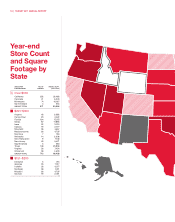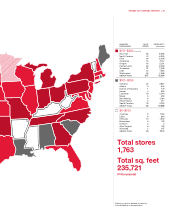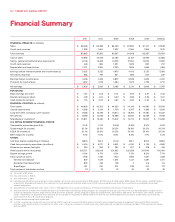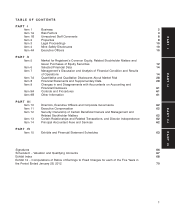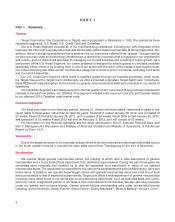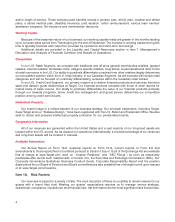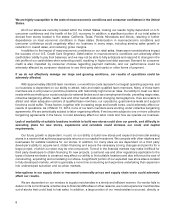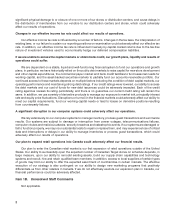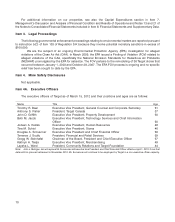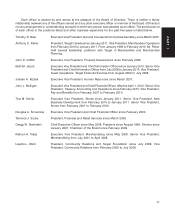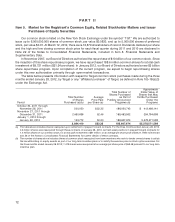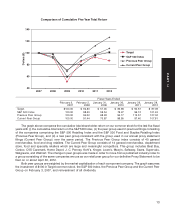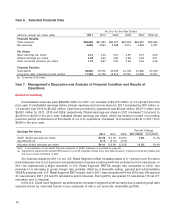Target 2011 Annual Report Download - page 29
Download and view the complete annual report
Please find page 29 of the 2011 Target annual report below. You can navigate through the pages in the report by either clicking on the pages listed below, or by using the keyword search tool below to find specific information within the annual report.
If we are unable to positively differentiate ourselves from other retailers, our results of operations could be
adversely affected.
The retail business is highly competitive. In the past we have been able to compete successfully by
differentiating our guests’ shopping experience by creating an attractive value proposition through a careful
combination of price, merchandise assortment, convenience, guest service and marketing efforts. Guest
perceptions regarding the cleanliness and safety of our stores, our in-stock levels, the convenience and reliability of
our multichannel guest experience and other factors also affect our ability to compete. No single competitive factor
is dominant, and actions by our competitors on any of these factors could have an adverse effect on our sales,
gross margin and expenses.
Our continued success is substantially dependent on positive perceptions of Target, including our owned
and exclusive brands.
We believe that one of the reasons our guests prefer to shop at Target and our team members choose Target as
a place of employment is the reputation we have built over many years of serving our four primary constituencies:
guests, team members, the communities in which we operate and shareholders. To be successful in the future, we
must continue to preserve, grow and leverage the value of Target’s reputation. Reputational value is based in large
part on perceptions of subjective qualities, and even isolated incidents that erode trust and confidence, particularly
if they result in adverse publicity, governmental investigations or litigation, can have an adverse impact on these
perceptions and lead to tangible adverse effects on our business, including consumer boycotts, loss of new store
development opportunities, or team member recruiting difficulties.
In addition, we sell many products under our owned and exclusive brands, such as Market Pantry, up & up,
Target Home, Merona and Mossimo. These brands generally carry higher margins than national brand products,
and represent a growing portion of our overall sales, totaling approximately one-third of sales in 2011. If one or more
of these brands experiences a loss of consumer acceptance or confidence, our sales and gross margin rate could
be adversely affected.
If we are unable to successfully maintain a relevant multichannel experience for our guests, our results of
operations could be adversely affected.
Our guests are increasingly using computers, tablets, mobile phones and other devices to shop in our stores
and online. As part of our multichannel strategy, we offer full and mobile versions of our website (Target.com) and
applications for mobile phones and tablets. In addition, we use social media as a way to interact with our guests and
enhance their shopping experiences. Multichannel retailing is rapidly evolving and we must keep pace with
changing guest expectations and new developments by our competitors. If we are unable to attract and retain team
members or contract third parties with the specialized skills needed to support our multichannel platforms, or are
unable to implement improvements to our guest-facing technology in a timely manner, our ability to compete and
our results of operations could be adversely affected. In addition, if Target.com and our other guest-facing
technology systems do not function as designed, we may experience a loss of guest confidence, data security
breaches, lost sales or be exposed to fraudulent purchases, which could adversely affect our reputation and results
of operations.
If we fail to anticipate and respond quickly to changing consumer preferences, our sales, gross margin and
profitability could suffer.
A substantial part of our business is dependent on our ability to make trend-right decisions in apparel, home
d´
ecor, seasonal offerings, food and other merchandise. Failure to accurately predict constantly changing
consumer tastes, preferences, spending patterns and other lifestyle decisions may result in lost sales, spoilage and
increased inventory markdowns, which would lead to a deterioration in our results of operations.
5
PART I



